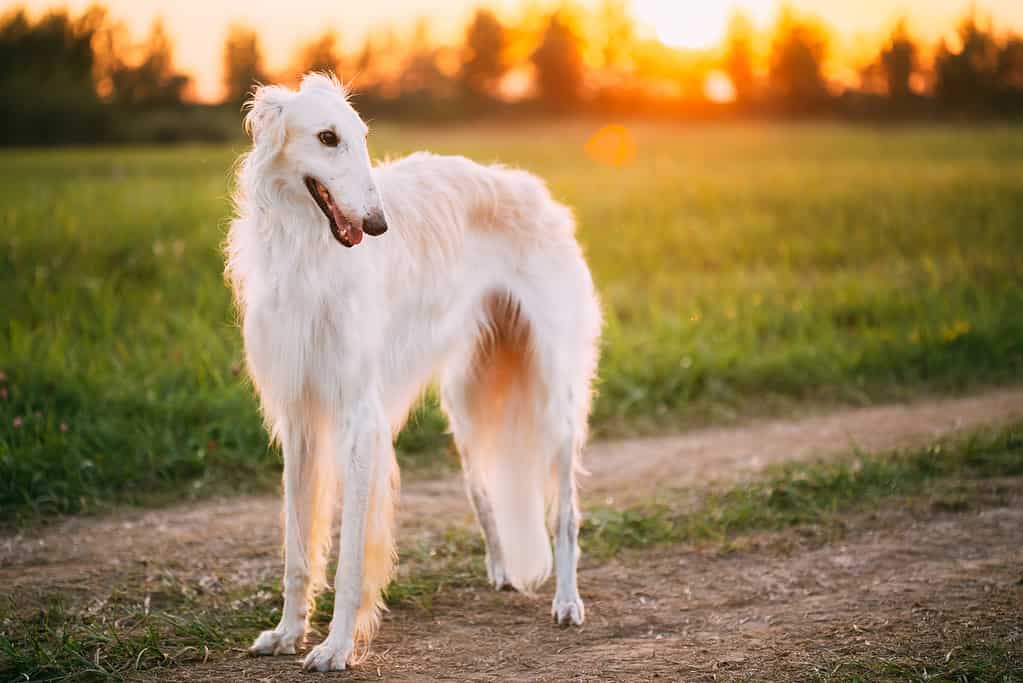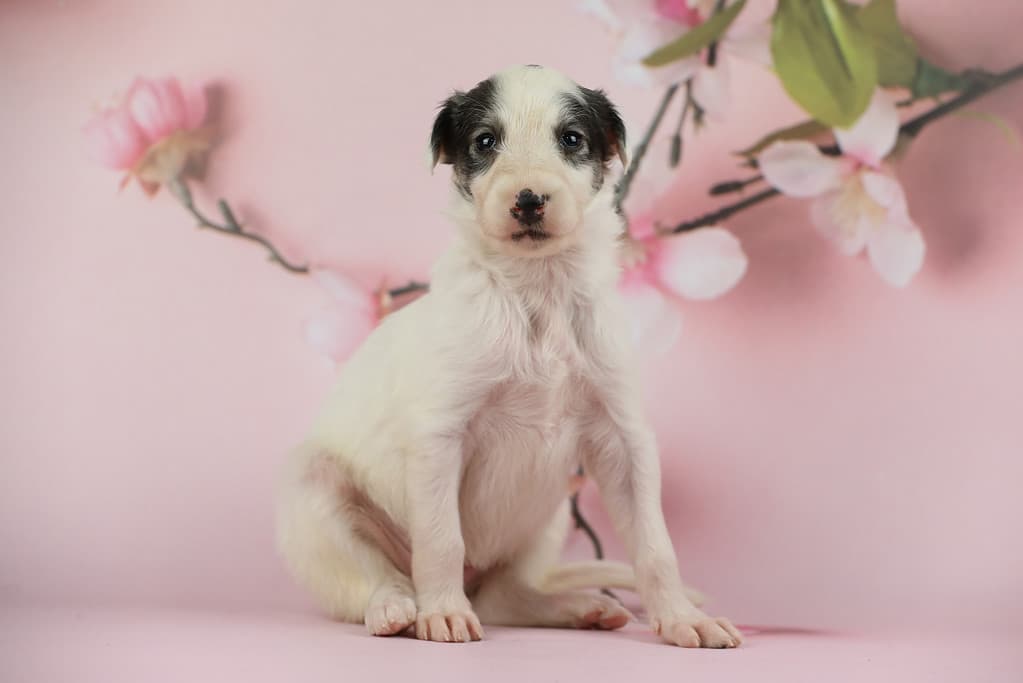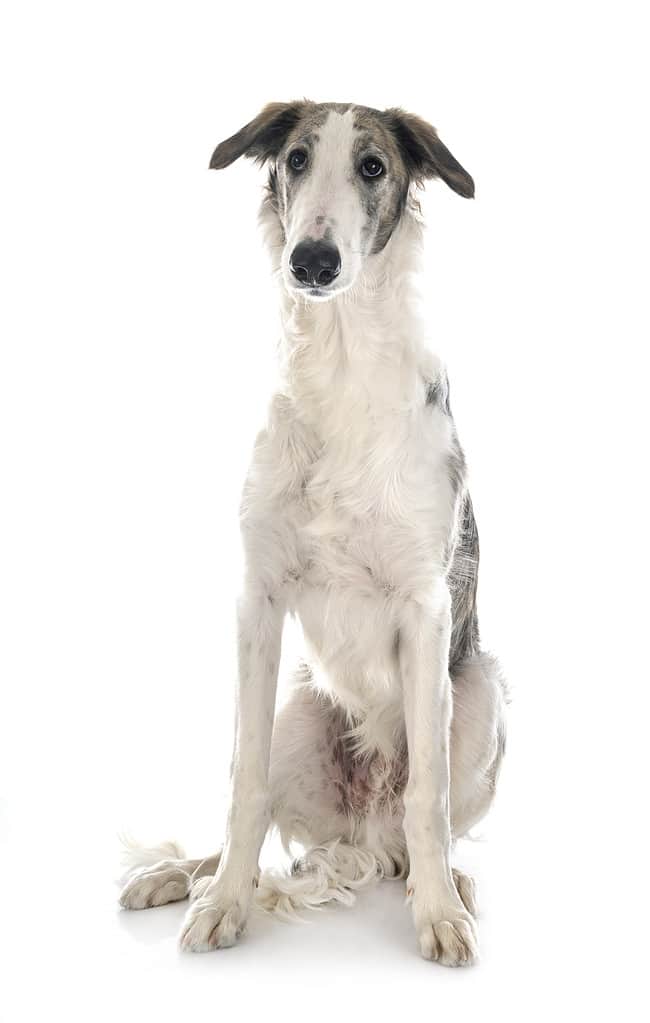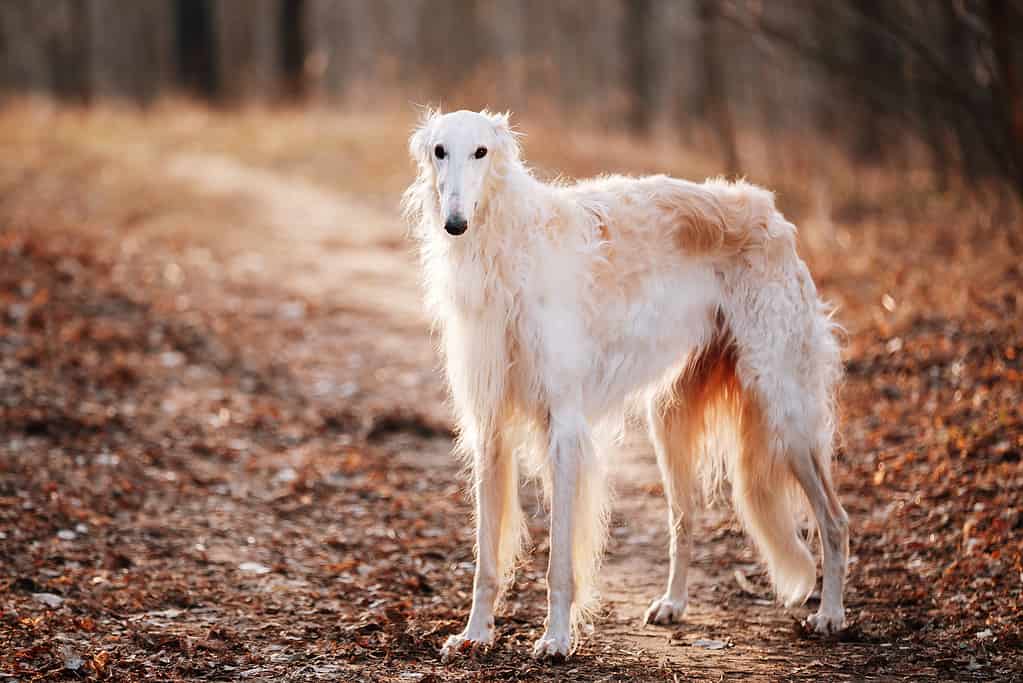Borzoi: Growth Chart, Milestones, and Training Tips
The regal Borzoi exudes beauty and brawn all rolled up in one elegant package. This giant breed is known for its calm temperament, swift speed, and silky coat. Borzoi are sighthounds, as they use their sight and speed to hunt as opposed to using scent like some other hunting breeds. Once known as the Russian Wolfhound, the breed’s original purpose was to hunt game, including pursuing wolves! In 1936, the breed’s name changed to Borzoi, which translates to “swift” or “fast”, in Russian. These aristocratic dogs are almost cat-like in personality. They tend to act quiet and dignified. However, they are very affectionate and loving with their families. Just beware of their need for speed! If you’re considering owning a Borzoi, read more about Borzoi growth and milestones, health complications, and useful feeding and training tips.
Borzoi Growth and Weight Chart by Age
Borzoi are considered a giant breed by the American Kennel Club. A huge amount of growth takes place in the first year of their lives. Individual dogs may vary by size and weight, but this general breakdown of Brozoi growth and milestones can help give you a sense of what to expect as your puppy grows over the first year of its life. Starting at around 3 months of age, Borzoi will gain in a general range of around two pounds per week. They will slow down as they get closer to their full size. By around 14 months, Borzoi will reach their approximate full size.
| Age | Average Male Weight in Pounds | Average Female Weight in Pounds |
| 15 weeks | 39 | 33 |
| 20 weeks | 51 | 42 |
| 25 weeks | 61 | 50 |
| 30 weeks | 69 | 57 |
| 35 weeks | 75 | 61 |
| 40 weeks | 79 | 65 |
| 45 weeks | 83 | 67 |
| 60 weeks | 88 | 70 |
When Will My Borzoi Stop Growing?

©Ryhor Bruyeu/iStock via Getty Images
Borzoi reach the majority of their growth by 14 months but will continue to fill out afterward. Until this point, Borzois should be fed the recommended serving size of high-quality puppy food three times a day. It’s also important to check in with your vet regularly to ensure your Borzoi is healthy and growing at the correct rate, as well as to make sure you’re feeding your puppy correctly. Puppies should visit the vet approximately every four weeks until 16 weeks of age to stay updated on their vaccine series. After that, around six months of age is recommended for a checkup.
How Big Will My Borzoi Be When It’s Fully Grown?
The size of a Borzoi can vary since it depends on everything from genetics to diet. But generally, the Borzoi Club of America states mature males should weigh anywhere from 75 to 105 pounds, and females are typically 15 to 20 pounds less than this range. Males are at least 28 inches tall at the withers, while females typically reach about 26 inches. As for overall body length, anywhere from 33 inches to 38 inches is considered to be the standard range.
The Biggest Borzoi Ever Recorded
Borzois can be big, but one dog in particular is gathering attention for her nose. Eris is a Borzoi located in Richmond, Virginia, and is one of the most famous Borzois in the world. She has a remarkably long snout, which measures 12.2 inches. Her owners claim her nose is the longest dog snout in the world. The adorable pup even has her own social media pages chronicling her adventures.
When Should My Borzoi Be Spayed or Neutered?
Traditionally, spaying and neutering were suggested as soon as a dog reached four to six months of age. However, newer research has shown that it benefits larger breeds to delay spaying and neutering until they have reached full maturity. Waiting longer for a dog to fully develop may reduce the risk of joint disorders and certain cancers. Borzois typically reach sexual maturity by 12 to 18 months of age or even later, which is why you may want to wait until at least then. Ultimately, deciding when to neuter is best to discuss with your veterinarian, as the right time depends on your individual dog.
When Should My Borzoi Be House Broken?
Work on housetraining your puppy as soon as you bring them home, around 8 to 12 weeks. Schedule bathroom breaks around every two hours, as well as after they play or eat. When house training any puppy, consistency and patience are key — accidents are bound to happen as they learn their new routine!
When Should My Borzoi Stop Eating Puppy Food?
Borzoi eat a surprisingly small amount given their large size. Puppies will eat more than adults as they grow rapidly. Nonetheless, this breed needs to stay on puppy food longer than smaller breeds, as Borzois generally don’t reach their full adult size and weight until well after one year of age. Switching to adult food too early can affect their development. They need the nutrients puppy food provides to support their growth. It’s best to work with your veterinarian to make the call on when to switch. But in general, feeding puppy food a little too long is thought to be better than not long enough.
When Will My Borzoi Start Losing Teeth?
Borzoi puppies start losing their baby teeth during the first four to six months of their life, with their adult teeth starting to emerge shortly thereafter. The puppy teething phase can last well throughout the first year of their lives, so it’s important to provide them with appropriate ways to chew to avoid destruction around your home! Providing various chew toys targeted at puppies is a must-have at this stage so your dog can satisfy their need to chew safely.
When Should I Start Training My Borzoi?
Training your puppy begins the day that you bring them home, as they learn what is proper behavior. Borzois are known for being gentle and smart yet also independent and stubborn, so it’s important to be patient and consistent when beginning their training. Additionally, as sighthounds, they are genetically inclined to want to chase things that move, so you’ll need to work on leash training them early to keep them safe. In the beginning, keep training sessions short, at a couple of minutes a number of times a day. As soon as your Borzoi has received their vaccinations, take them out on a leash to socialize them to the world, and consider signing up for puppy training classes.
Borzois love doing activities such as lure coursing, where a mechanized, plastic lure circles around a track. This is a fun activity that satisfies the Borzoi’s need to run and chase but also helps bond them to you through training.
What Cues Should I Teach My Borzoi First?
When you begin your Borzoi’s training journey, learning the basics is important as they translate into proper behavior in all aspects of your dog’s life.
Come: For a Borzoi in particular, recall is very important as they are a breed that is easily distracted by what they consider prey, and love nothing more than to run off at full steam chasing. Teaching them to come is important for their own safety.
Stay and Sit: Both these commands can help teach your Borzoi puppy impulse control and are basic commands that not only help to get your puppy’s attention but can keep them from exhibiting bad behaviors like jumping and running away.
Leave It: This command is also useful for the independent Borzoi to learn. It may come in handy when they want to sprint off after something that catches their attention.
Whatever command you choose to start with, keep in mind that gentle Borzois are sensitive, and do best with positive training techniques. Praise them when they get it right, but avoid punishing or yelling at them while they are still learning.
When Will My Borzoi Calm Down?
Overall, Borzois are generally calm dogs by nature. But calmness doesn’t mean that they don’t require daily exercise where they get to run freely. Borzoi are physically mature at around 14 months. They don’t typically mature mentally until well past puppyhood, around age two. That said, expect them to still retain their puppy “joie de vivre” well into adulthood.
Consistent training and socialization around other dogs, people, and places during the first year of their lives creates a well-adjusted dog. Borzois are prone to both stubbornness and chasing, so working on reigning in these impulses through positive techniques is key. Borzoi may always need to be leashed when out in public due to their desire to run freely. Part of caring for them properly is recognizing their instincts.
Common Health Issues Your Borzoi Might Experience
For your Borzoi to live a long and healthy life, it’s important to become familiar with the types of health conditions this breed is more prone to so you can manage them properly. These are some health issues to be aware of:
Bloat: As a large and deep-chested breed, Borzois are more prone to bloat than some other breeds. This life-threatening condition occurs when a dog’s stomach fills with gas, food, or fluid and twists. It needs immediate veterinary care so it’s important to familiarize yourself with the various signs, which include panting and a hard stomach.
Sensitivity to anesthesia: Sighthounds such as Borzoi are known to be more sensitive to anesthesia than other breeds due to their lean body composition, something an experienced veterinarian should be aware of.
Wobbler Syndrome: Borzois are prone to this condition caused by compression of the spinal cord, most often at the base of the neck. It can lead to a wobbly gait or even paralysis.
Hypothyroidism: Signs include lethargic behavior and inactivity. The dog may have a dull coat with areas of hyperpigmentation and even hair loss. The Borzoi may also experience skin infections and chronic ear infections.
Pictures of Borzois as Puppies

©Olha Haletska/iStock via Getty Images
Pictures of Borzoi at 6 Months

©cynoclub/iStock via Getty Images
Pictures of Fully Grown Borzoi

©bruev/iStock via Getty Images









